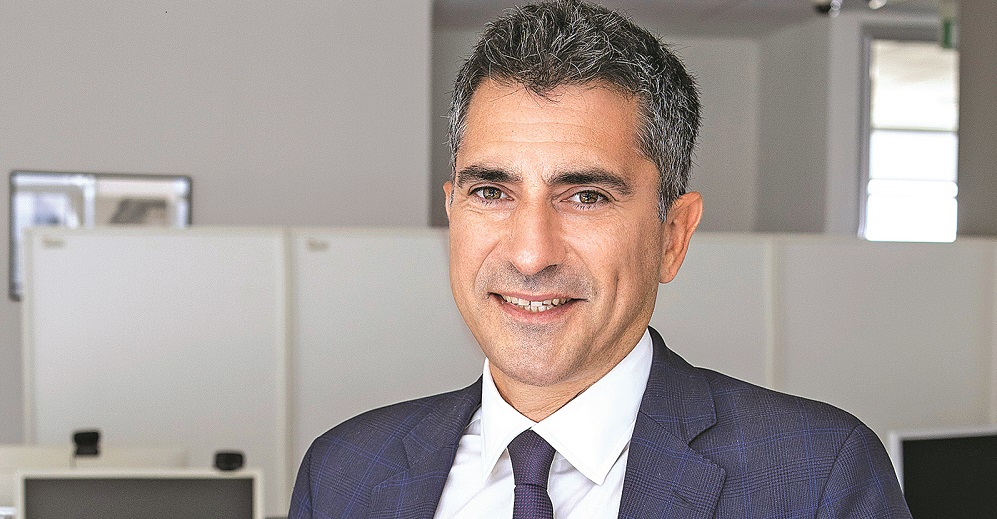MATTEO COLANGELI, FIC BOD MEMBER AND EBRD DIRECTOR FOR THE WESTERN BALKANS
The Crisis Will Take Its Toll
Mounting inflationary pressures are weighing in on the disposable income and input costs of businesses, while financing conditions are tightening as central banks around the world fight inflation. Worsened expectations of global and European growth are set to spill over onto the Serbian economy. Yet we believe that the Serbian economy will continue to grow at the same pace as it did in 2022.

Serbia is a resilient country that boasts a relatively well-diversified economic structure, supported by hard-earned macro-financial stability. This was evident during the pandemic-induced shock and the subsequent strong rebound. We expect growth to continue, though at a more moderate pace, as the increasingly challenging global macroeconomic environment takes its toll, says Matteo Colangeli, EBRD Director for the Western Balkans, with whom we spoke soon after the formation of the new Serbian government.
Around 35% of last year’s EBRD investments were directed towards environmental infrastructure, renewable energy, circular economy and resource efficiency across the Western Balkans. For how long can this trend be sustained, given the ongoing energy crisis and the decision of many countries in the EU to reconsider coal?
The crisis has only prompted governments to consider emergency action to ensure the security and affordability of the energy supply because we didn’t reduce energy waste and develop sufficient clean energy sources fast enough. More low-carbon energy, improved energy efficiency in industry, buildings and transport, coupled with more energy storage, would have helped ease the current crisis, while faster transition from fossil fuels to clean energy is the best way to exit this situation. Energy efficiency is the key to addressing many of today’s critical challenges. Demand-side action has a particularly important role to play now that global energy prices are high and volatile, hurting households, industries and entire economies, as that offers immediate opportunities to reduce energy costs and reliance on imported fuels. While the crisis is telling us that we should increase our energy efficiency targets and production of renewable power, the extreme events of this summer, with unprecedented heatwaves and detrimental droughts, are telling us to invest in technologies and solutions that are environmentally sustainable.
How does the EBRD intend to help the Western Balkans, and Serbia specifically, to accelerate its green economy transition? Do you see real commitment on the side of the Serbian government to improve waste management and increase recycling?
Accelerating the transition to a green economy is our single most important objective in the Western Balkans and we will deploy substantial and increasing resources to support governments in creating conducive regulatory environments and catalysing private sector investments across all areas – energy, transport, building renovation and environmental infrastructure, such as waste and wastewater treatment facilities. A current example that we are particularly proud of is a programme across 11 municipalities to introduce renewable energy sources in district heating generation through technologies involving photovoltaic, geothermal, heat pumps and waste heat recovery. This is precisely the kind of innovative and forward-looking approach that we would like to foster across the region. When it comes to waste management and recycling specifically, the Serbian government adopted a new National Waste Management Programme earlier this year, which is an important step towards developing an integrated system and transitioning to a circular economy. The programme includes ambitious objectives in terms of the rate of recycling and the elimination of biodegradable waste in landfill sites. We are fully supportive of these targets and working closely with the Ministry of Environmental Protection to make both knowhow and financing available. We are very proud of our two landmark investments in this sector: the Vinča project, which is the first and largest environmental PPP in the region; and our regional
solid waste management programme that will upgrade facilities serving a population exceeding two million people.
To what extent does the current policy mix reflect the changing economic realities, such as narrower fiscal space? What would you recommend to the new Serbian government?
Serbia entered the current global crisis with a robust medium-term growth outlook and macro-financial stability. Monetary policy tightening, in response to elevated inflationary pressures, has been timely and warranted. Fiscal policy measures are rightfully aimed at shielding households from rising prices, particularly in terms of food, which accounts for nearly double the consumption expenditure in Serbia compared to the EU. While blanket fiscal measures are a popular choice for governments around the EBRD regions and easy to implement, these have significant fiscal costs. Targeted support would reap the greatest benefit at the least fiscal cost, but it requires a higher level of administrative capacity and the reform of social assistance systems, backed by a robust social registry. Accelerating the development of renewables, stepping-up efforts to scale up energy efficiency and focusing investments on crucial infrastructure would help reduce the fiscal burden of energy imports and support future energy security. Reform efforts to increase financial and operational standing, as well as corporate governance, in the public sector and among state-owned enterprises, come at no fiscal cost, while they would limit the fiscal risk.
Improving the governance of state-owned enterprises is a longstanding issue that’s quite often been poorly addressed by former Serbian governments. What are the necessary preconditions for stronger progress in this area?
Reforms needed to strengthen the governance of stateowned enterprises typically require strong political commitment and long timelines. The improvement of corporate governance and the commercialisation of state-owned enterprises underpins market economies, but should also benefit state enterprises themselves, by bringing more efficient operations, as well as society as a whole, through improved quality of services and less reliance on the state budget. All of this requires a clear definition of objectives for the management of state-owned enterprises, as well as careful monitoring of whether and how those objectives are delivered upon. Serbia took a positive step with the adoption of the Strategy for State Ownership and Management of Business Entities Owned by the Republic of Serbia for the period from 2021 to 2027, which EBRD supported in preparing. The strategy sets a clear vision for reforms that have the potential to contribute to economic growth, reduce fiscal risks, and ultimately improve the welfare of citizens. It is now time for this ambition to be turned into law and secondary regulation, with the Ministry of Economy expected to take the lead. When it comes to implementation, it may be worth considering a phased approach, where the new framework and practises will first be introduced at enterprises of greater importance to citizens and the economy.
We are committed to investing in the green transition, ready to support Western Balkan countries in their decarbonisation efforts, and bullish about the scale of green investments in the coming years
In that respect, EPS proved to be particularly weak, and its status is worrisome under the new circumstances and with
a very tough winter season expected. What sort of support can EBRD offer under these new circumstances?
EPS and the entire Serbian energy system face tough challenges this winter. Energy saving is the priority in the immediate term, but this crisis, and the structural changes it is triggering in energy markets, should provide the opportunity to embark on a new path. A massive wave of energy efficiency investments is needed to ensure affordability and preserve the competitiveness of the Serbian economy. And, coupled with that, an ambitious plan to ramp up renewables, specifically through the launch of competitive auctions to allocate capacities and tap into the strong existing interest among private investors. We are deeply engaged on all these aspects and stand ready to step up our support in terms of financing and creating the most conducive environments to develop energy efficiency and Renewables to their full potential.
How well are the Serbian government and Serbian companies utilising digitalisation as a tool for growth? How prepared are SMEs for such a change?
The pandemic clearly triggered the acceleration of digitalisation at all levels of the economy. We see very strong interest among Serbian SMEs in ‘traditional’ sectors to up their game in the digital space, and today more than half of the business advisory projects we deliver in the country include a digital component. When it comes to start-ups, Serbia has a vibrant eco-system that we are nurturing at all levels: working with accelerators and innovative companies individually, through a well-established regional programme called Star Ventures. We are also providing direct financing to support the local digital champions that are expanding their reach beyond Serbia to become regional and global players. HTEC and the substantial acquisition financing we provided to them is an example that brings us a particular sense of pride. Furthermore, we have been engaged materially in recent years to support the digitalisation of business inspections. And we’ve just now launched a new project to streamline permitting processes for renewable energy projects.
As Serbia has built up a base of exportoriented companies and proved an attractive market to foreign investors, it stands to benefit
from global supply chain re-organisation, particularly in terms of nearshoring given its proximity to EU countries.
To what extent is Serbia ready to take advantage of the re-organisation of global supply chains?
Serbian exports have seen robust growth in the past decade, with manufacturing companies leading goods exports and ICT and business services leading service exports. As Serbia has built up a base of export-oriented companies and proved an attractive market to foreign investors, the country stands to benefit from global supply chain re-organisation, particularly in terms of nearshoring due its close proximity to EU countries. The main challenge should be to continue gradually moving away from attracting resource-intensive production towards
more sophisticated activities of higher complexity and added value. In addition, strengthening the linkages between foreign direct investors and local companies would help maximise benefits for the broader economy through productivity and technological spill-overs.
How, in that respect, do you see your role as a member of the FIC Board of Directors?
Pragmatic and transparent dialogue between the government and private sector is paramount for a healthy business environment, and it is a dynamic that we are keen to support across the region through different initiatives. We think the FIC plays an important and constructive role in Serbia and are pleased to contribute to its activities, including through my membership on the Board of Directors. Serbia is well placed to continue attracting a strong flow of investments and we are determined to play our part in maximising economic opportunities for this country and its people.

